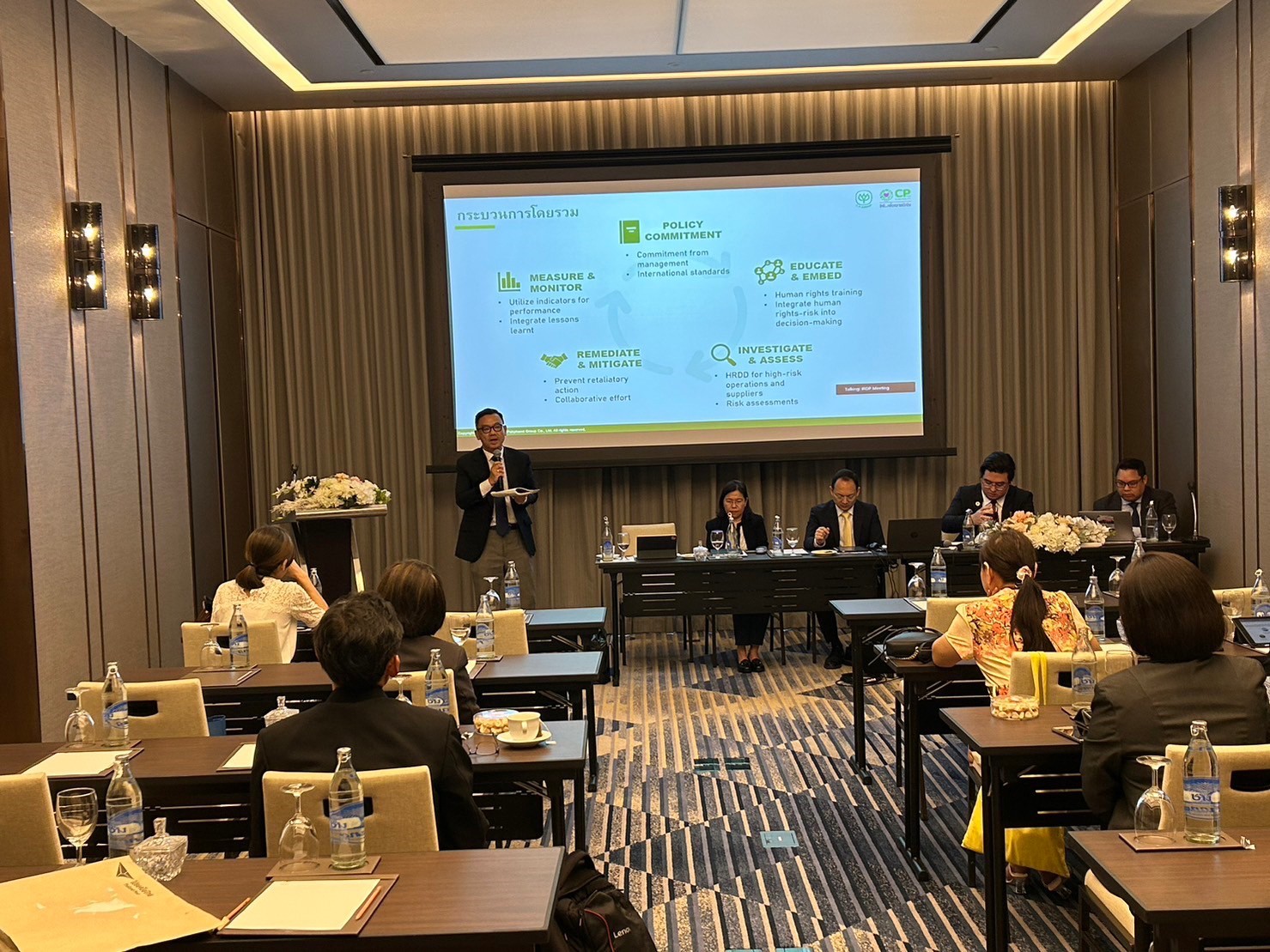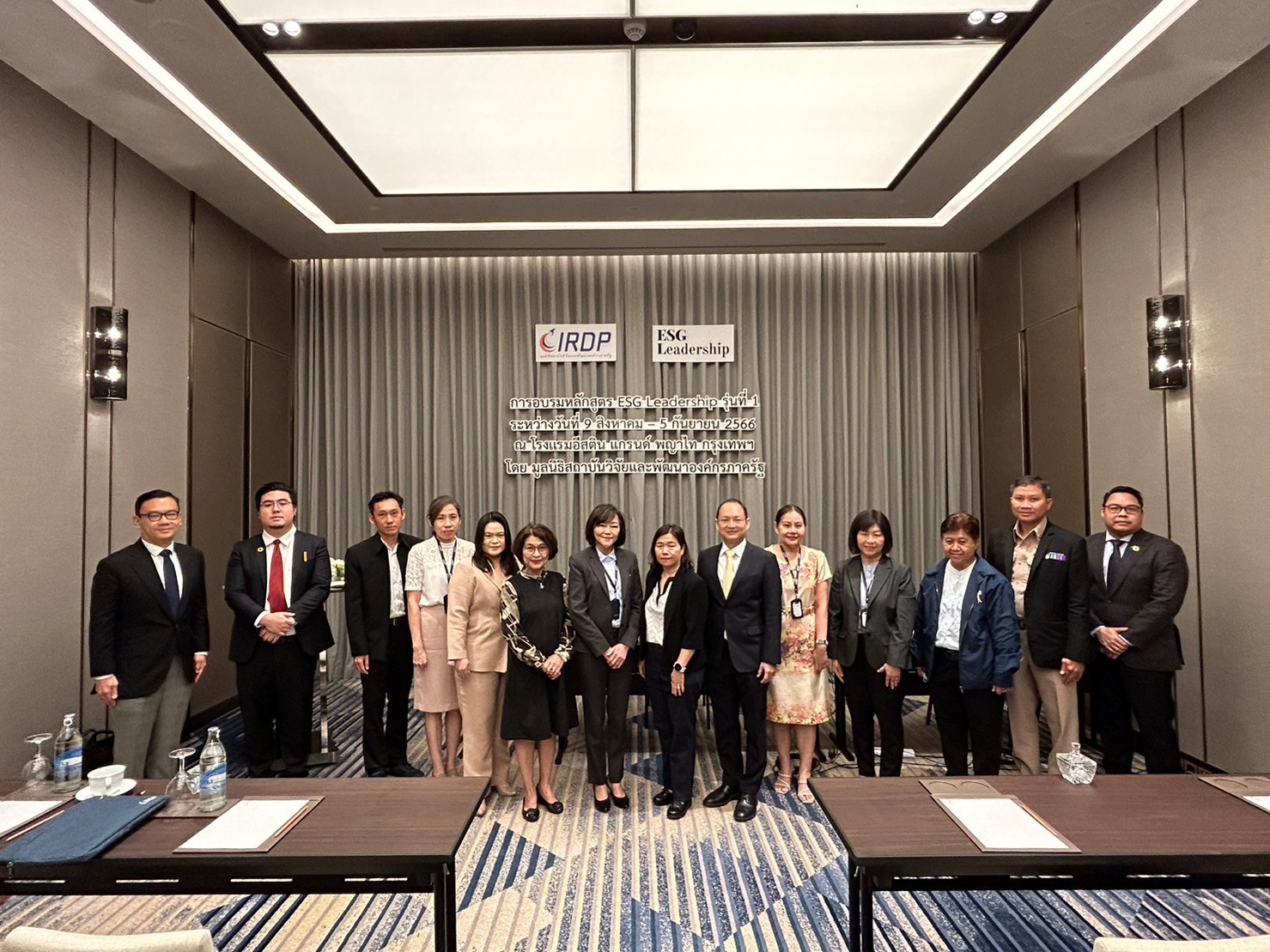
4 กันยายน 2566 ดร. เนติธร ประดิษฐ์สาร ผู้ช่วยบริหารประธานคณะผู้บริหาร รองกรรมการผู้จัดการอาวุโส สำนักความร่วมมือระหว่างประเทศด้านความยั่งยืนและสื่อสารองค์กร เครือเจริญโภคภัณฑ์และ คุณสมเจตนา ภาสกานนท์ ผู้อำนวยการด้านพัฒนาความยั่งยืน สำนักบริหารความยั่งยืน ธรรมาภิบาลและสื่อสารองค์กร เครือเจริญโภคภัณฑ์ เข้าร่วมแบ่งปันความรู้เรื่อง ESG Due Diligence ให้กับผู้เข้าร่วมการอบรมหลักสูตร จากมูลนิธิสถาบันวิจัยและพัฒนาองค์กรภาครัฐ (Institute of Research and Development for Public Enterprises: IRDP) ผู้เข้าร่วมอบรมประกอบด้วยผู้บริหาร ของหน่วยงานภาครัฐ รัฐวิสาหกิจและภาคเอกชน โดยเครือเจริญโภคภัณฑ์ ได้บอกเล่าประสบการณ์ และแนวคิดเรื่องการพัฒนาองค์กรอย่างยั่งยืน (ESG Due Diligence) โดยเฉพาะ 3 ด้านหลักคือ สิ่งแวดล้อม สังคม และการกำกับดูแลกิจการที่ดี รวมถึงการบริหารจัดการด้านความยั่งยืนและตรวจสอบรอบด้าน ให้กับผู้เข้าอบรม
ดร.เนติธร เน้นย้ำถึงความสำคัญของความยั่งยืนในการดำเนินธุรกิจ ด้วยการตรวจสอบอย่างละเอียดทั้งกระบวนการการดำเนินธุรกิจ การปฏิบัติต่อพนักงาน ไปจนถึง ปริมาณการปล่อยก๊าซคาร์บอน เราจะต้องตรวจสอบร่วมกับผู้มีส่วนได้เสียและแก้ไขปัญหาอย่างเป็นระบบ ทั้งนี้ คุณสมเจตนา และคุณดาวฤดี แสงจุ้ยวงษ์ รองผู้อำนวยการด้านพัฒนาความยั่งยืน เครือเจริญโภคภัณฑ์ กล่าวถึงมาตรฐานสากลที่บริษัทต่างๆ ควรปฏิบัติและเกณฑ์มาตรฐานที่เครือฯได้รับ ตัวอย่างเช่น Science Based Targets Initiative (SBTi) ได้รับรอง เป้าหมายลดการปล่อยก๊าซเรือนกระจกระยะสั้นภายในปี พ.ศ.2573 ของเครือเจริญโภคภัณฑ์ ในฐานะองค์กรที่มีการกำหนดเป้าหมายสอดคล้องกับเกณฑ์การลดการปล่อยก๊าซเรือนกระจกตามมาตรฐานสากลที่ SBTi กำหนด และเครือฯ ได้รับผลการประเมินด้านการบริหารจัดการ เปลี่ยนแปลงสภาพภูมิอากาศจาก Carbon Disclosure Project (CDP) โดยเครือเจริญโภคภัณฑ์ ได้รับคะแนน A- เพื่อให้บรรลุเป้าหมายนี้ บริษัทได้ทุ่มเทความพยายามอย่างมากในการทำความเข้าใจห่วงโซ่อุปทานของตนเอง ซึ่งรวมถึงข้อมูลเกี่ยวกับการปล่อยก๊าซคาร์บอน ของเสีย การใช้น้ำ และอื่นๆ รวมถึงการใช้มาตรการเพื่อจัดการ บรรเทา หรือป้องกันผลกระทบเชิงลบตลอดห่วงโซ่อุปทาน
บริษัทยังได้มีกระบวนการตรวจสอบสิทธิมนุษยชนอย่างรอบด้าน ตลอดห่วงโซ่อุปทาน (Human Rights Due Diligence: HRDD) ที่พัฒนาขึ้น โดยผ่านการอ้างอิงและการปรึกษาหารือจากหน่วยงานมาตรฐานที่เป็นที่ยอมรับในระดับสากล เช่น หลักการชี้แนะของสหประชาชาติว่าด้วยธุรกิจและสิทธิมนุษยชน ในการนี้ คุณวีระนนท์ ฟูตระกูล รองผู้อำนวยการ และคุณนิธิพัศ นันทวโรภาส ผู้จัดการแผนก สำนักความร่วมมือระหว่างประเทศด้านความยั่งยืนและสื่อสารองค์กร เครือเจริญโภคภัณฑ์ ได้เล่าถึง กระบวนการ HRDD 8 ขั้นตอน ที่เครือฯได้มีการพัฒนา และความมุ่งมั่นของผู้บริหารระดับสูง เพื่อให้แน่ใจว่ามีการคุ้มครองสิทธิมนุษยชนตลอดห่วงโซ่คุณค่า นโยบายและการฝึกอบรมด้านสิทธิมนุษยชน การประเมินผลกระทบด้านสิทธิมนุษยชน ((Human Rights Impact Assessment: HRIA) กลไกการร้องทุกข์และการเยียวยา รวมถึงโครงการที่เครือฯริเริ่มขึ้น เพื่อแก้ไขปัญหาด้านสิทธิมนุษยชน เช่น โครงการจัดหางานที่มีจริยธรรม โครงการดังกล่าวระบุถึงความเสี่ยงที่แรงงานข้ามชาติถูกแสวงหาผลประโยชน์ ซึ่งรวมถึงค่าธรรมเนียมการจัดหางานที่มากเกินไป การบังคับใช้แรงงาน หรือการละเมิดในรูปแบบอื่น ๆ ดังนั้นเราจึงมีกระบวนการจัดหางานที่เชื่อถือได้ผ่านการตรวจสอบและการประเมิน และปรับปรุงขีดความสามารถ ผ่านการฝึกอบรม เครือฯจึงสามารถจัดการกับความเสี่ยงเหล่านี้ได้
ดร.เนติธร ปิดการบรรยายโดยกล่าวถึงประเด็นด้านสิทธิมนุษยชนที่บริษัทเคยเผชิญในอดีต และแนวทางการรับมือของบริษัท ดร.เนติธรได้ย้ำถึงความสำคัญของการมีส่วนร่วมและสื่อสารกับผู้มีส่วนได้เสียทุกฝ่าย ด้วยความโปร่งใส โดยภาคธุรกิจสามารถทำงานร่วมกับภาคประชาสังคม ภาครัฐ และผู้มีส่วนได้ส่วนเสียอื่นๆ เพื่อจัดการกับความเสี่ยง ESG ได้อย่างมีประสิทธิภาพ

C.P. Group Shares Knowledge on ESG Due Diligence with the Institute of Research and Development for Public Enterprises
September 4th, 2023 – Dr. Netithorn Praditsarn, Executive Assistant to Group CEO and Senior Vice President of the Global Partnership for Sustainability and Communications of Charoen Pokphand Group and Mr. Somjettana Pasakanon, Director of Sustainability Development of Charoen Pokphand Group joined the IRDP to share C.P. Group’s sustainability framework with various Thai state-owned enterprises and companies. On September 4th, the Institute of Research and Development for Public Enterprises (IRDP) held a lecture on ESG Due Diligence for the first cohort of their ESG Leadership masterclass, with representatives of C.P. Group as speakers. Attendees included representatives from several state and private enterprises. Participants joined in the session to listen and learn from C.P. Group’s experience in the field of “ESG” (Environmental, Social, Governance) and sustainability management and due diligence.
Dr. Netithorn began by stressing the importance of sustainability in doing business; with increasing scrutiny on the ways business operate, treat their workers, and emit carbon, companies must ensure that they engage with stakeholders and address these salient issues systemically. Mr. Somjettana and Ms. Daoruedee Saengjuiwong, Deputy Director of Sustainability Management Systems of Charoen Pokphand Group, spoke of the many international standards companies should abide by, and the benchmarks which can help prove their compliance. Examples include the Science Based Targets Initiative (SBTi), which had recently approved C.P. Group’s 2030 carbon-neutral target, and the Carbon Disclosure Project (CDP) from which C.P. Group received a score of A-. To achieve this, the Group had dedicated much effort into understanding its own supply chain – including information on carbon emissions, waste, water usage, and more – and deploying measures to address, mitigate, or prevent adverse impacts throughout.
The Group also has worked to tackle the potential of human rights violations throughout its supply chain through a human rights due diligence (HRDD) process developed through extensive reference and consultation from internationally-recognized standards such as the United Nations Guiding Principle on Business and Human Rights. Mr. Viranon Futrakul, Vice President, and Mr. Nitipat Nantavaropas, Department Manager of the Global Partnership Office for Sustainability and Communications explored the eight-step HRDD process that C.P. Group had developed. This included the commitments by senior executives and management to ensure the protection of human rights throughout the value chain, policies and training on human rights, the human rights impact assessment (HRIA), grievance and remedy mechanisms, and more. Mr. Viranon and Mr. Nitipat also spoke on Group initiatives to address human rights salient issues, including the Ethical Recruitment Project. The Ethical Recruitment Project addresses the risk of migrant workers being exploited, including through excessive recruitment fees, forced labor, or other forms of abuse. By creating a pool of trusted recruitment agencies through audits and assessments, and improving their capabilities through training, the Group is able to address these risks.
Dr. Netithorn closed the lecture by discussing some of the human rights issues the Group has been confronted with in the past, and the ways the Group tackled them. Dr. Netithorn also reiterated the importance of engaging and communicating with all stakeholders; with greater transparency, businesses can work with civil society, governments, and other stakeholders to effectively address any ESG risks.

